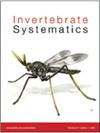Multilocus and mitogenomic phylogenetic analyses reveal a new genus and species of freshwater mussel (Bivalvia: Unionidae) from Guangxi, China
IF 1.9
2区 生物学
Q3 EVOLUTIONARY BIOLOGY
引用次数: 2
Abstract
Abstract. Freshwater mussels are essential for the integrity of freshwater ecosystems but numbers of these organisms are declining rapidly at regional and global scales. The phylogenetic and biogeographic aspects of the rich unionoid fauna of the Indo-Burma region are becoming increasingly well understood. Guangxi is part of the Chinese portion of the Indo-Burma biodiversity hotspot but regional studies of the freshwater mussel diversity are scarce. In this study, we report a new genus and species of freshwater mussel from Guangxi, China. Genetic datasets including three genes (COI, 16S rRNA and 28S rRNA) and complete maternal mitogenomes were compiled to infer the phylogenetic history of the group. Molecular phylogenetic analyses showed that the new species formed a monophyletic group and was closely related to Obovalis and Ptychorhynchus in the tribe Gonideini of the subfamily Gonideinae. Morphological and molecular evidence supported that these specimens represent an undescribed genus and species that we describe as Postolata guangxiensis gen. nov., sp. nov. The discovery of this new taxon adds to the known level of endemism of freshwater mussels in Guangxi and a detailed survey of uncharted areas should reveal new diversity in the future. We also suggest that complete mitogenomes or even genome-scale nuclear data should be used for phylogenetic reconstructions when proposing major taxonomic changes. ZooBank: urn:lsid:zoobank.org:pub:76FC5A1D-7507-4F26-A12C-EC08AB333274多基因座和有丝分裂基因组系统发育分析揭示了广西淡水贻贝的一个新属和新种(双壳目:单壳目)
摘要淡水贻贝对淡水生态系统的完整性至关重要,但在区域和全球范围内,这些生物的数量正在迅速下降。印度-缅甸地区丰富的单体动物群的系统发育和生物地理学方面正变得越来越清楚。广西是印度-缅甸生物多样性热点的中国部分,但对淡水贻贝多样性的区域研究很少。在本研究中,我们报道了中国广西淡水贻贝的一个新属和一个新种。汇编了包括三个基因(COI、16S rRNA和28S rRNA)和完整的母体有丝分裂基因组的遗传数据集,以推断该群体的系统发育史。分子系统发育分析表明,该新物种形成了一个单系群,与Gonideinae亚科Gonideini部落的Obovalis和Ptychorhynchus亲缘关系密切。形态学和分子证据支持,这些标本代表了一个未描述的属和种,我们将其描述为Postolata guangxiensis gen.nov.,sp.nov.。这个新分类单元的发现增加了广西淡水贻贝的已知特有性水平,对未知区域的详细调查应该会在未来揭示新的多样性。我们还建议,在提出重大分类变化时,应使用完整的有丝分裂基因组甚至基因组规模的核数据进行系统发育重建。ZooBank:urn:lsid:ZooBank.org/pub:76FC5A1D-7507-4F26-A12C-EC08AB333274
本文章由计算机程序翻译,如有差异,请以英文原文为准。
求助全文
约1分钟内获得全文
求助全文
来源期刊

Invertebrate Systematics
生物-动物学
CiteScore
4.30
自引率
9.10%
发文量
35
审稿时长
>12 weeks
期刊介绍:
Invertebrate Systematics (formerly known as Invertebrate Taxonomy) is an international journal publishing original and significant contributions on the systematics, phylogeny and biogeography of all invertebrate taxa. Articles in the journal provide comprehensive treatments of clearly defined taxonomic groups, often emphasising their biodiversity patterns and/or biological aspects. The journal also includes contributions on the systematics of selected species that are of particular conservation, economic, medical or veterinary importance.
Invertebrate Systematics is a vital resource globally for scientists, students, conservation biologists, environmental consultants and government policy advisors who are interested in terrestrial, freshwater and marine systems.
Invertebrate Systematics is published with the endorsement of the Commonwealth Scientific and Industrial Research Organisation (CSIRO) and the Australian Academy of Science.
 求助内容:
求助内容: 应助结果提醒方式:
应助结果提醒方式:


